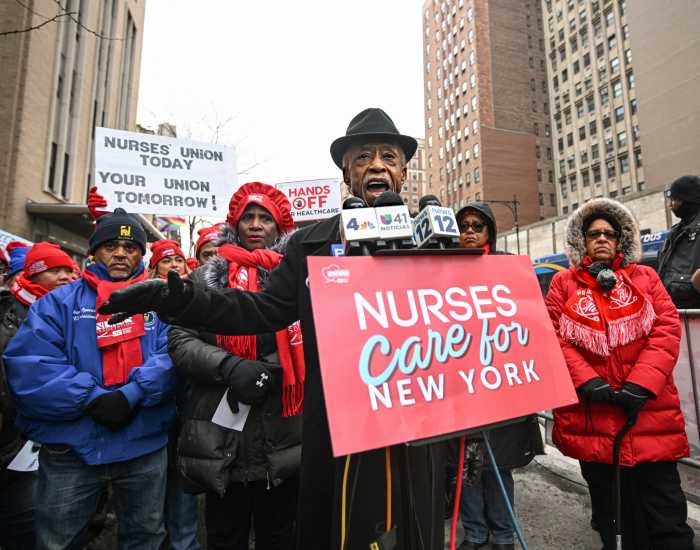Jim McGreevey wasted his life living a lie. Now he wants us to waste our time reading more of them.
The gay establishment’s embrace of McGreevey is a depressing spectacle, treating the disgraced and treacherous politician as if he is some kind of courageous role model for people who come out late in life. Maybe he will be in inspiration to other 47-year old, closet-case corrupt governors looking to chuck their second beard wives and partake of A-list gay life, but today there are high school students like Tully Satre in Virginia, helping lead the fight against the anti-gay marriage referendum there, who have more to teach us—and could do infinitely more good with the $26.95 people are shelling out for McGreevey’s “The Confession.”
It is one thing to suffer in the closet on Brokeback Mountain in the 1960s or Iran today, but McGreevey is a highly educated, middle class guy who grew up in a Jersey suburb and received his higher education years after the Stonewall Rebellion in Washington, Boston, and New York. He describes going to the library at age 13—as many did in 1970—and finding few books on homosexuality and all of them written by anti-gay psychiatrists. It left him “steeped in hopelessness.”
McGreevey wants us to see him as a victim of a strict Catholic upbringing, but there is nothing extreme about his loving family or parish.
But not once in the rest of the book does McGreevey engage with any of the ideas in the gay literature that has been published since—starting with George Weinberg’s 1971 “Society and the Healthy Homosexual”—not to mention the literally hundreds of thousands of gays and lesbians who lived in the same cities as he did.
I kept reading the book expecting to hear about some unique disorder that McGreevey was subject to, but all he comes up with is the dissociation typical of adolescents grappling with homosexual urges. Rather than being in complete denial, he experiments sexually with another boy and is aware of profoundly warm feelings for boys he admires. He also tries typical efforts to make himself “straight,” from reading Playboy to scoring with girls.
As much as McGreevey wants us to see him as a victim of a strict Catholic upbringing, there is nothing extreme about his seemingly loving family or parish. And his scruples don’t prevent him from participating in a lifetime of lying to the women he married, enjoying men through public sex—though he calls his routine anonymous encounters both “exhilarating” and “sinful and unhealthy”—going to strip clubs with straight political colleagues to throw them off the scent, and opposing gay marriage as governor.
McGreevey’s disgusting story isn’t about someone who couldn’t understand who he was, but someone who knew what he was and simply wanted power more. He acknowledges that if Golan Cipel, the aide he claims to have loved and bedded, had not threatened to extort him, he would have continued with his double life.
Like New Jersey and you, McGreevey and Cipel were perfect together. The governor was exploiting a woman, his second wife Dina, because he felt he needed her to get elected. Cipel, a creep who denies being gay or having sex with McGreevey, used a man because he wanted access to power.
McGreevey never acknowledges the cynicism of embracing an identity as a “gay American” in his resignation speech, changing the subject from mounting charges of corruption in his administration. He said the liaison with Cipel was wrong because it violated his marriage vows, not because he sexually exploited an employee—arguably actionable behavior. As the New Brunswick Sentinel editorialized this past week, the speech was “a shameful sleight-of-hand maneuver.”
McGreevey wrote that in therapy he realized he was “pathologically attached to ‘having a public.’” That pathology continues with the publication of this book. While he admits that he injured everyone from “Dina to the citizens of New Jersey,” the book renews those injuries. Dina, who is not speaking publicly while she copes with McGreevey’s betrayal and being a single mom, can hardly be happy that this louse didn’t just go away quietly and enjoy his new life with his financier partner, Mark O’Donnell, in a $1.5 million house in Plainfield. Instead, he parades the story of her humiliation in the book and on “Oprah,” admitting that she has not forgiven him nor should she.
And nor should the citizens of New Jersey. This book has come out just in time to remind voters of Democratic sleaze and may be a factor in defeating Senator Robert Menendez this November, keeping the Senate in the hands of the virulently anti-gay Republican Party.
One of the most demonstrable lies in the book is McGreevey’s contention that his decision to stay in office until mid-November of 2004 after resigning in August had to do with providing for an orderly succession and his worries about Dina, rather than denying the voters the chance to pick a new governor in a special election. “Nobody even mentioned the special election law until much later,” he wrote, when the fact is that the headline in The New York Times four days after his announcement was, “Some Democrats Are Said to Want McGreevey Out Fast.”
If you are hoping for a candid look at New Jersey politics, I’m no expert. The state political reporters who have reviewed the book dismiss it as a whitewash, although the New York Post reported that he may have revealed enough to re-open criminal investigations into his dealings as governor.
If McGreevey doesn’t go to jail, he is shamelessly telling talk show hosts that he wants to work on “education and poverty” and that he is humble enough not to want to be a gay leader, but to be “one of the troops.” I wonder how he can help.
A guy who seduced a male employee while his wife was in the hospital after a difficult pregnancy doesn’t make a very good advocate for same-sex marriage. But given McGreevey’s long history of getting away with public sex, maybe he will consider donating all the profits of his book to a defense fund to clear the names of the hundreds of men who were falsely arrested and convicted in Jersey’s Palisades Park for alleged trysts, an outrage well-documented by the reporting of Duncan Osborne in Gay City News. Many of those infamous arrests by state troopers were made while McGreevey was governor.
If he can’t bring himself to make real amends, perhaps McGreevey will have the decency to just slip away into obscurity the way Charles Van Doren did in the 1950s after the TV quiz show scandal, instead of publicly twisting his life of duplicity into some sort of morality tale. After confession, after all, is supposed to come penance—at least to people who believe in God as much as McGreevey claims to.
The gay leaders who are treating McGreevey as some sort of hero are doing the movement no service, any more than the Human Rights Campaign is in honoring Lance Bass for coming out five minutes ago with a “visibility” award—especially given the faded boy band star’s recent proclamation, “I want people to take away from this that being gay is a norm. That the stereotypes are out the window… I’ve met so many people like me that it’s really encouraged me. I call them the SAGs—the straight-acting gays. We’re just normal, typical guys. I love to watch football and drink beer.”
Neither man is ready for primetime.
October 11 is National Coming Out Day, commemorating the 19th anniversary of the March on Washington for LGBT Rights that brought out 750,000 to protest the policies of the Reagan administration on AIDS and against gay rights—even more than the first march in 1979 that McGreevey acknowledges skipping while living in DC. We should all hope that everyone with a gay, lesbian, bisexual, or transgendered identity comes out, including the laggards like McGreevey. But the examples we should hold up for emulation are the courageous people who are doing this in hostile environments from your average high school to the streets of Moscow—not those who were forced out and have yet to come to grips with all the damage they have done. We have to distinguish between celebrity and achievement or we’re not going anywhere.
gaycitynews.com



































